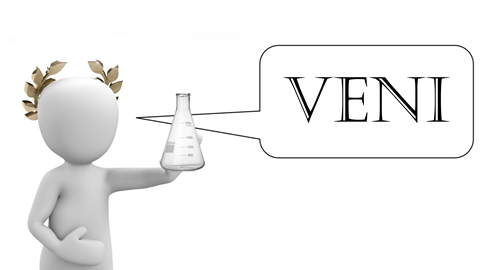Two hundred early-career scientists have received up to €320,000 in the form of a Veni grant from the NWO Talent Programme.
The Veni grants are awarded annually by NWO. A total of 1,365 preliminary applications were submitted, of which 469 progressed to the full application stage, with 200 receiving funding. Among the recipients are a number of our society members, whom we highlight below.
Reuben Leveson-Gower (KNCV, NBV, NVBMB, TU Delft): Teaching Life New Chemistry
The invention of chemical synthesis methods called organocatalysis has given society access to a variety of important medicinal molecules, yet the inefficiency of these methods creates an environmental burden. Life is the master of sustainable chemistry, producing complex molecules from renewable feedstocks in a mild manner with enzymes. Greener organocatalysis would be powered by enzymes, just as life is, yet enzymes which replicate all the types of organocatalysis have yet to be found. I will identify enzymes which perform unnatural reactions inspired by this chemistry, and mould them to their new tasks through evolution.
Rik Lindeboom (NBV, Nederlands Kanker Instituut): Quantitative decoding of MYC-driven reprogramming of the epigenome
MYC is a protein involved in regulating genes and is linked to 70% of all tumors. It can reprogram how a cell interprets its DNA, which can lead to cancer. This research focuses on understanding how MYC causes these changes in cells. Using innovative techniques like BANC-seq and CasTuner, the study investigates how the amount of MYC determines the outcomes of this reprogramming. The results will provide fundamental insights into how such proteins reprogram cells and help us better understand how cancer develops, paving the way for new treatment options.
Robert Schmitz (NVBMB, TU Delft): Nature-inspired rare earth element separation
Rare Earth Elements (REEs) are essential for modern technologies such as wind turbines, electric cars, and smartphones. However, extracting and separating these metals is inefficient and harmful to the environment. This project takes inspiration from nature to solve this challenge. Specialized microbes naturally take up REEs from the environment. I will identify and engineer their REE-binding proteins to create a more sustainable and selective way to extract and separate individual REEs from industrially relevant sources and waste streams. This project replaces harmful chemicals with nature-inspired alternatives, advancing sustainability and REE circularity.
Jana Volaric (KNCV-sectie MCCB, Leiden University): Controlling protein cross-talk of cannabinoid receptors with light
Most proteins in our body are modified with small molecules which orchestrate where they go, what they do and how they do it. These modifications are very diverse in nature and often transient, making it difficult to investigate their molecular role in biological processes. I will use light-responsive molecules directly introduced into cannabinoid receptors, important proteins which regulate several biological processes in our brain and immune system to study their dynamics. This project will shine light on questions regarding how cannabinoid receptors function and open possibilities to improved drug design and development.
Wen Wu (NVBMB, Rijksuniversiteit Groningen): Smaller but better: Treating genetic diseases using small and precise molecular scissors
CRISPR-Cas gene therapy has incredible potential to treat genetic diseases, by cutting and repairing faulty DNA sequences and will play a key role in the future of precision medicine. Although some molecular scissors currently in use are effective, they are still limited in use and far from perfect. Delivering large molecular scissors to specific parts in the human body remains a major challenge. This research focuses on studying and optimizing smaller molecular scissors to make them more efficient, precise, and robust for genome editing. By creating these compact tools, this work aims to enable safer, targeted treatments for genetic diseases.
For the complete list of awardees and more information, see the NWO website.













Nog geen opmerkingen